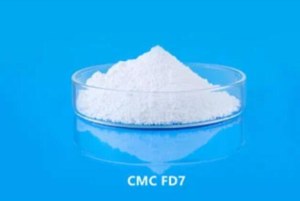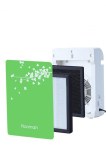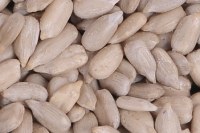Carboxymethyl cellulose (CMC) is a versatile ingredient that has revolutionized the detergent industry. With its unique properties and numerous advantages, CMC has become an essential component in modern detergents. CMC is a water-soluble polymer derived from cellulose, a natural substance found in plant cell walls. Its exceptional thickening, stabilizing, and water-retaining abilities make it an invaluable additive in detergent formulations. One of the significant advantages of CMC in detergents is its remarkable thickening power. By incorporating CMC, detergents can achieve the desired viscosity, ensuring proper flow and adherence to surfaces during application. This results in improved product performance and enhanced cleaning efficiency. Additionally, CMC acts as a stabilizer, preventing the separation of different detergent components and maintaining the desired
CMC is a water-soluble polymer made by chemically modifying natural cellulose. Detergent grade CMC is commonly used as a thickener, stabilizer, and dispersant in various types of detergent formulations, including laundry detergents, dishwashing detergents, and industrial cleaners.
CMC Uses in Detergent
CMC for detergent has several properties that make it ideal for use in the detergent industry. These include:
High water solubility: CMC in detergent is highly water-soluble, which helps to improve the dissolution and dispersion of the detergent in water.
Thickening and stabilizing properties: CMC in detergent powder can thicken and stabilize the detergent formulation, improving its viscosity and preventing phase separation.
Excellent dispersibility: Detergent grade CMC can disperse and suspend soil particles and other contaminants, improving the cleaning performance of the detergent.
Compatibility with other ingredients: CMC powder in detergent is compatible with a wide range of other ingredients commonly used in detergent formulations, making it a versatile and flexible additive.
CMC For Detergent For Sale
Carboxymethyl cellulose (CMC) is a commonly used ingredient in detergents, providing various functional benefits such as thickening and stabilizing. There are different types or cmc chemical for detergent, depending on the specific requirements and formulation characteristics. Here are some common types of CMC detergent for sale.
CMC FD7
KimaCell® CMC FD7 sodium carboxymethyl cellulose (CMC-Na) is a carboxymethylated derivative of cellulose.
CMC FD40
KimaCell® CMC FD40 sodium carboxymethyl cellulose is referred to as CMC or SCMC, also known as cellulose gum, which is the most important ionic cellulose gum and an anionic linear polymer substance.
How Is CMC Chemical Used in Detergent Production?
The specific usage and dosage of CMC detergent grade may vary depending on the application and other factors, such as the type of detergent formulation and processing conditions. it's important to follow standard safety procedures when handling and using CMC in liquid detergent, including using appropriate protective equipment and handling it in a well-ventilated area.
Here are some general guidelines for using detergent grade CMC:
01.
Determine the appropriate dosage: The optimal dosage of detergent grade CMC depends on the specific application and desired properties. Typically, dosage levels range from 0.1% to 1.0% by weight of the detergent formulation.
02.
Prepare the detergent formulation: The detergent formulation should be prepared according to standard industry procedures, and the CMC in detergent should be added slowly and evenly while stirring.
03.
Mix thoroughly: After adding the detergent grade CMC, the formulation should be mixed thoroughly to ensure that the CMC is evenly distributed throughout the material.
04.
Adjust the rheology: If necessary, the rheology of the detergent formulation can be adjusted by adding more or less CMC. Rheology modifiers such as deflocculants or dispersants may also be added to achieve the desired rheology.
05.
Test the final product: After processing, the final detergent formulation should be tested to ensure that it meets the desired properties and performance criteria, including viscosity, stability, and cleaning performance.
Advantages of CMC Use in Detergent
Detergent grade cmc methyl cellulose has several advantages that make it a valuable additive in the detergent industry. Some of the main advantages of detergent grade CMC include:
Improved cleaning performance:
CMC chemical for detergent can disperse and suspend soil particles and other contaminants, improving the cleaning performance of the detergent.
Enhanced stability:
CMC for detergent can thicken and stabilize the detergent formulation, improving its viscosity and preventing phase separation.
Improved texture and appearance:
CMC for detergent can improve the texture and appearance of the detergent, making it more appealing to consumers.
Reduced formulation costs:
CMC for detergent is a cost-effective ingredient that can reduce the overall formulation costs of the detergent.
Environmentally friendly:
CMC for detergent is a biodegradable and renewable ingredient that can be used to reduce the environmental impact of detergent formulations.
Improved user experience:
CMC for detergent can improve the user experience of the detergent, making it easier to dissolve and use.
CMC Chemical For Detergent Precautions
CMC methyl cellulose is commonly used as a detergent additive due to its ability to improve the stability, viscosity, and cleaning performance of detergent formulations. However, it is important to take certain precautions when using CMC chemical in detergents. Here are some precautions to consider:
Handling and Storage: When handling CMC chemical for detergent, it is important to follow good hygiene practices. Wear appropriate protective equipment, such as gloves and goggles, to avoid direct contact with the skin, eyes, or inhalation of the powder. Store CMC detergent in a cool, dry place, away from direct sunlight, heat sources, and incompatible substances.
Allergic Reactions: While allergic reactions to CMC are rare, some individuals may be sensitive or allergic to this chemical. If you have a known allergy to cellulose derivatives or have experienced any allergic reactions to similar products in the past, it is advisable to consult a healthcare professional before using detergents containing CMC.
Inhalation: When working with CMC powder in detergent, avoid breathing in the dust or aerosol particles. If handling CMC in a powdered form, use appropriate engineering controls, such as local exhaust ventilation, to minimize airborne dust. If there is significant exposure to CMC dust, move to an area with fresh air and seek medical attention if respiratory symptoms occur.
Eye and Skin Contact: In case of eye contact, immediately flush the eyes with plenty of water for at least 15 minutes and seek medical attention if irritation persists. If CMC use in detergent comes into contact with the skin, wash the affected area thoroughly with soap and water. If skin irritation occurs or persists, seek medical advice.
Ingestion: CMC use in detergent is not intended for ingestion. If swallowed accidentally, do not induce vomiting and seek medical attention immediately. Provide the medical professional with the product information and follow their instructions.
Compatibility: CMC use in detergent is generally compatible with most detergent formulations. However, it is recommended to perform compatibility tests before using CMC in a new detergent formulation or in combination with other additives. This will help ensure the desired performance and stability of the detergent.
Regulatory Compliance: Adhere to all relevant regulations and guidelines when using CMC in detergent formulations. Ensure compliance with local, regional, and international regulations regarding handling, storage, labeling, and disposal of CMC chemicals.
Product Safety Data Sheet (SDS): Obtain and carefully read the SDS provided by the CMC manufacturer. The SDS provides detailed information about the chemical properties, handling precautions, first aid measures, and emergency procedures related to CMC use in detergent.
It is important to note that the precautions mentioned above are general guidelines and may vary depending on the specific formulation of the detergent and individual circumstances. If you have specific concerns or questions about the use of CMC in detergent, it is recommended to consult the CMC manufacturer or a relevant technical expert for personalized advice.
Location : HUAGUANG RD 188,ZHANGDIAN,ZIBO, 255000 SHANDONG,
Contact : CELL KIMA , 86 533 6281218







